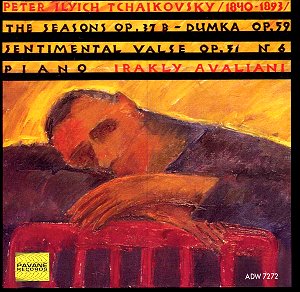The Georgian pianist Irakly Avaliani
studied at the Tchaikovsky National Conservatory in Moscow. Like many
Russians, his playing is distinguished by its accurate finger-work and
its sparing use of the sustaining pedal. Unfortunately, he can all too
often seem too detached to convey the meaning of this music.
Any recording which brings attention
to Tchaikovsky's tender and often melancholy 'Seasons' (1875/6) is welcome. Perhaps the
title is a trifle misleading: it is, in fact, a sequence of twelve movements,
one for each month of the year, each preceded by a poetic quotation
(helpfully reproduced in the accompanying booklet). Neither is this
the barn-storming Tchaikovsky of the First Piano Concerto: instead,
it requires a pianist capable of the greatest introspection (I am not
the first commentator to point out the influence of Schumann on this
work).
Avaliani has the sense not to over-sentimentalise,
and this non-interventionist approach works well: Both the openings
of 'March' and 'July' exemplify this well (QUOTES 1 and 2), whilst 'August'
demonstrates Avaliani's rapid, light touch (QUOTE 3). However, he fails
to consistently delve below the surface of this music: better to try
Pletnev on Great Pianists of the
Twentieth Century 456 931-2 or Ashkenazy on Decca (466 562-2).
The 'Dumka', Op. 59 is a free rhapsody.
Avaliani, however, loosens the structure so much that it emerges as
diffuse rather than improvisatory. The faster, Lisztian passages are
drily accurate but little else and the ending sounds perfunctory, leaving
an uncomfortable, unfinished impression.
The 'Sentimental Waltz', Op. 51 No. 6
(presumably an 'encore/filler'), a kind of Russian version of Chopin's
efforts in this genre, is again over-literal. The low playing time further
precludes this disc from a whole-hearted recommendation.
Colin Clarke

